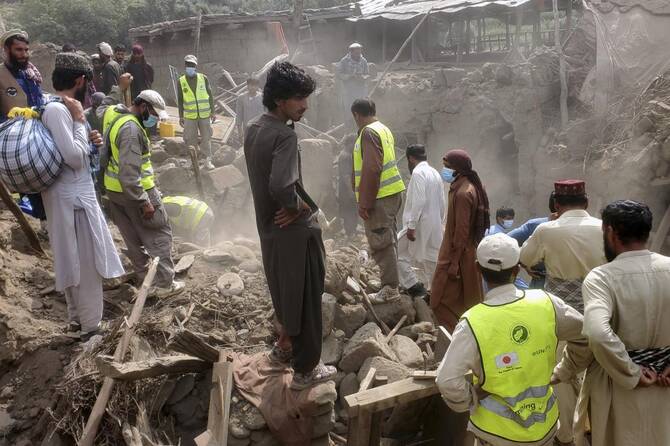KABUL: Afghanistan airdropped commandos on Wednesday to rescue survivors from the rubble of homes in the mountainous east, where powerful earthquakes this week killed 1,400 people. Authorities also ramped up efforts to deliver food, shelter, and medical supplies.
The first earthquake, with a magnitude of 6, struck Kunar and Nangarhar provinces around midnight on Sunday at a shallow depth of 10 km (6 miles). The tremor, one of Afghanistan’s worst in recent years, caused widespread destruction.
A second quake, measuring 5.5, hit on Tuesday. It triggered panic, interrupted rescue operations, and sent rocks crashing down mountains, cutting off access to remote villages.
Disaster management chief in Kunar, Ehsanullah Ehsan, said commando forces parachuted into areas where helicopters could not land to evacuate the injured. “We set up a camp where service and relief committees are coordinating supplies and emergency aid,” he said. He added that two centers are overseeing the transfer of the injured, burial of the dead, and search for survivors.
Earlier, rescuers used helicopters to ferry the wounded to hospitals as they battled harsh weather and mountainous terrain to reach quake-hit villages along the Pakistan border. The tremors flattened mudbrick homes and left thousands stranded.
The Taliban administration reported 1,411 deaths, 3,124 injuries, and more than 5,400 destroyed homes. The United Nations warned the toll could rise as victims remain trapped under rubble.
A Reuters journalist who reached the area before Tuesday’s aftershock said the quakes damaged or destroyed nearly every home. Residents dug through rubble with their hands, searching for survivors. The second tremor flattened houses that had survived the first.
The impoverished nation of 42 million struggled to mount rescue and relief operations with limited resources and little international aid.
The UN Office for the Coordination of Humanitarian Affairs (OCHA) said poorly built mudbrick homes collapsed easily, while heavy rains in recent days left the ground unstable. OCHA called for emergency shelter, food, clean water, sanitation facilities, and medical supplies to prevent further disaster.
Médecins Sans Frontières (MSF) distributed trauma kits at two hospitals in the affected areas. “We saw many patients treated in the corridors and health workers in urgent need of supplies,” said Dr. Fazal Hadi, MSF’s deputy medical coordinator in Afghanistan. He added that hospitals were already operating at full capacity before the quake.
Also Read: PM Shehbaz, President Xi pledge stronger Pakistan-China strategic ties
Afghanistan sits on a fault line where the Indian and Eurasian tectonic plates meet, making the Hindu Kush mountain range highly prone to deadly earthquakes.





